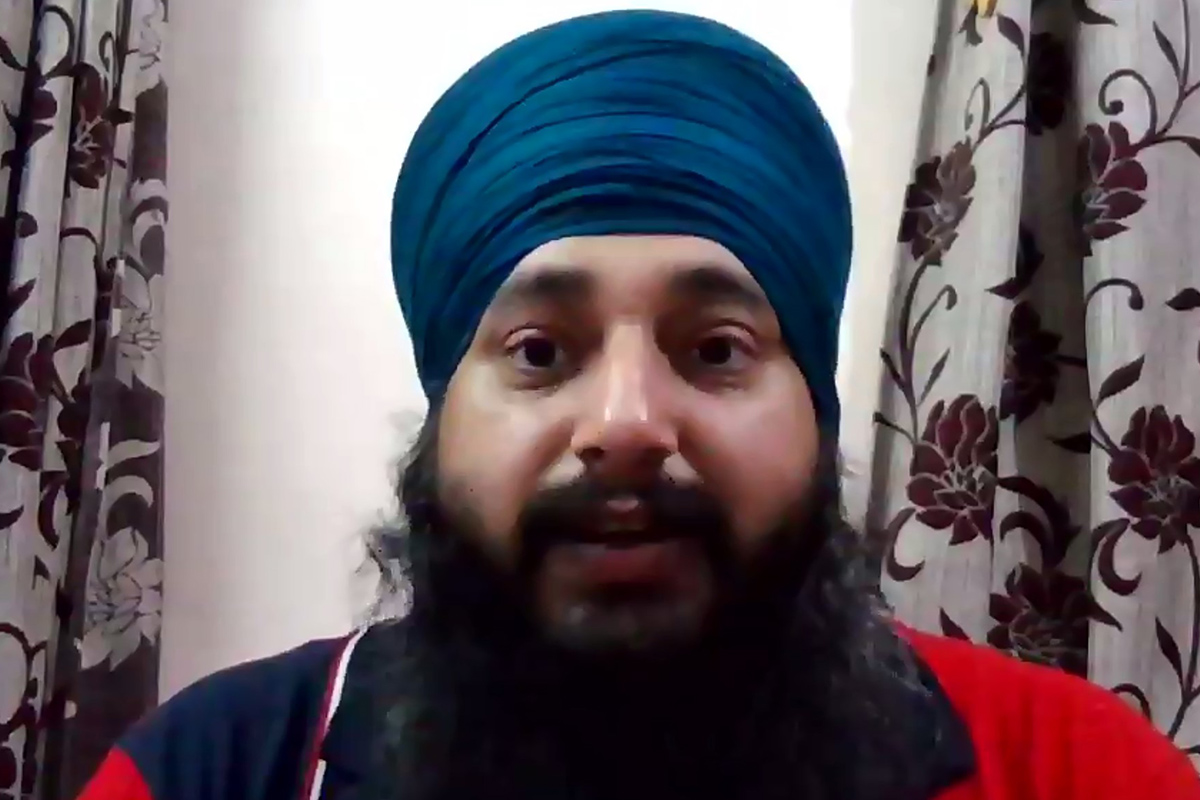
Jaswinder Singh, secretary of the Sikh Volunteers Australia
Among the many presenters at the 2022 delegates conference was Jaswinder Singh, secretary of Sikh Volunteers Australia. He spoke about the work of Sikh Volunteers in providing free food to disadvantaged individuals and families, as well as the cultural considerations that nurses and midwives should be aware of when they have Sikh community members in their care.
Presenting virtually, from India, Mr Singh began by noting that data from the 2021 census shows that Australia’s Sikh population grew by 80 per cent between 2016 and 2021, and that there are now more than 300,000 Sikh community members in Australia – with the majority living in Victoria. This means that healthcare workers including nurses and midwives are likely to care for Sikh community members at some point.
After providing a brief overview of the history of the Sikh religion, and showing a video discussing their work feeding the hungry, Mr Singh explained aspects of the Sikh religion and articles of faith that could help healthcare providers who have Sikh patients.
The five articles of faith
Sikhs wear five articles of faith, colloquially known as the 5Ks:
- kesh: unshorn hair on any part of their body; hair on the head is typically tied in a knot and crowned with a turban
- kanga: a small wooden comb, placed in the knot under the turban
- kara: an iron bangle
- kachera: prescribed shorts
- kirpan: a sheathed sword, worn at all times – even when bathing and sleeping
Mr Singh noted that the kirpan is the article of faith that raises the most questions among non-Sikhs. The word kirpan is a combination of kirpa (meaning an act of compassion or mercy) and aan (meaning honour). It symbolises its wearer’s ‘commitment to resist oppression and injustice and is worn to protect our own honour and to protect anyone else who can’t protect themselves’.
The section 8B exemption in Victoria’s Control of Weapons Act 1990 means is it not illegal for Sikhs to wear their kirpan in public.
Sikh patients
‘It is important that healthcare providers consult with Sikh patients about their personal level of religious observations and practices,’ Mr Singh said. Some topics that you might like to discuss with your patient include:
- articles of faith
- removal of hair
- ablution, bathing and cleanliness
- dietary needs
- prayer.
Hair shouldn’t be removed from any part of the Sikh patient’s body without their consent, or the consent of a substitute decision maker (usually a family member). If a Sikh patient has impaired capacity, their condition is life-threatening and there is no time to obtain consent, medical treatment should be carried out without delay. But the cutting of any hair should be avoided unless urgent or life-threatening medical treatment cannot be carried out without its removal.
If a Sikh patient has capacity for decision making and refuses medical treatment on the basis of faith (because their hair cannot be removed), their wishes must be followed and the patient should be informed that they may be required to sign a ‘discharge against medical advice’ certificate.
Sikh patients may prefer to be examined by a healthcare provider of their own gender. Consent should always be sought, where possible, before touching a Sikh community member, as touching without consent is considered disrespectful.
Most Sikhs are vegetarian. Some Sikhs do not follow a vegetarian diet, but non-vegetarian Sikhs are not permitted to eat any meat that has been ritually slaughtered, and they should therefore not be offered halal or kosher meals.
Visiting the sick is an important cultural and religious practice for Sikhs. Sikh patients may therefore have a large number of visitors, including those from outside their immediate family.
Maternity services
Sikh mothers may wish to always keep the five articles of faith on during childbirth. This may require keeping the kachera (shorts) on one leg. Shaving of the perineum may not be acceptable.
After childbirth, a family member may wish to perform a special ceremony; as part of the ceremony, the infant is given a few drops of holy water and a prayer is recited.
Community health services
When greeting someone from the Sikh community, it’s respectful to do so with your hands in a prayer position, palms together. ‘When you do this,’ Mr Singh said, ‘community members know that you are friendly, that you’re trying to help.’
A Sikh place of worship, known as gurdwara, is also a community centre and in addition to a prayer hall it usually contains a library, a kitchen and dining hall, and other community facilities – including medical facilities. If entering a gurdwara, you should remove your shoes, cover your head, and not talk loudly inside. If it isn’t possible to remove your shoes for workplace health and safety reasons, alternatives should be explored.
Alcohol, tobacco and other controlled substances are strictly prohibited in Sikh homes and in the gurdwara (including in the parking lot).
End of life
Healthcare providers should include family members when discussing advanced care planning with a patient, Mr Singh said. Sikhs may wish to recite prayers or read scripture when nearing death, and family and friends may wish to be present. Holy water from the gurdwara may be given to the patient to sip.
The articles of faith shouldn’t be removed from a deceased Sikh patient’s body – not even for an autopsy; this includes hair from any part of the body. The body should be covered with clean linen and shrouded. The family members may also wish to wash and clothe the body immediately after death. They may wish to remove the body to a funeral home for cremation as soon as possible, or they may wish to wait for a Sikh priest to arrive first.
Being aware of the cultural religious requirements when caring for members of the Sikh community can help nurses and midwives to ‘bring mutual cooperation and prosperity to the whole community’, Mr Singh concluded.
The ANMF is looking forward to working with and further supporting Sikh Volunteers Australia.




